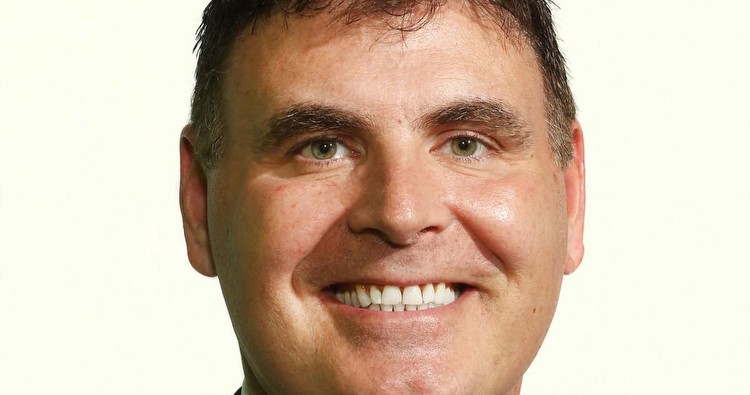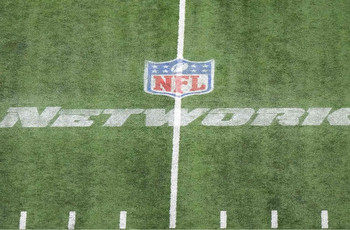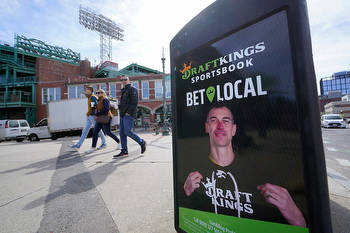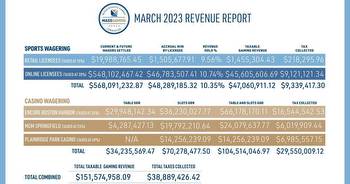MARK-TO-MARKET: Sports betting soars to record levels, bringing record revenues

Ladies and gentlemen, place your bets!
For decades, professional sports leagues like the NFL, NBA, MLB and NHL railed against the notion of legalized sports betting. To them, they argued, it challenged the very integrity of the game. But in 2018, the U.S. Supreme Court struck down the existing federal ban that prohibited wagering on sporting events. The Court’s decision immediately opened a floodgate of cash-infused investors and companies willing to step in and satisfy Americans’ desire to bet on both professional and collegiate sports.
Today, sports betting is legal in 35 states plus the District of Columbia, including Illinois and Iowa. Three more states – Florida, Vermont and Maine – have legalized sports betting but have yet to launch any operations. In these 35 states, people can place their wagers in-person at casinos or through online betting platforms called sportsbooks. Illinois and Iowa state laws allow for both wagering options. Some of the larger online sportsbooks are FanDuel, DraftKings, Caesars, BetMGM and BetRivers, though many others exist.
For gamblers, the sports betting options are near-endless. One can place a bet on the more popular NFL, NBA, MLB and NHL games as well as on soccer, boxing, NASCAR, golf and tennis events. Bets can also be placed on lesser-known professional sports such as cricket, rugby, jai alai and yes, even ping pong. Who knew that ping pong had its own professional league? Betting on collegiate sports is typically limited to football and basketball games.
For the gaming industry, legalized sports betting generates massive revenues. In the April-June second quarter, according to the American Gaming Association (AGA), sports betting generated a record $2.33 billion in revenues, a 58% increase from the second quarter of 2022. Through the first six months of the year, it has generated $5.18 billion in revenues, up 66.5% from the first half of 2022.
For states and individual sports leagues, their entrance into the realm of legalized sports betting is driven not by some renewed sense of enlightenment, but by money. Lots of money. For state and local governments, legalized gambling – which includes sports betting – translates to substantial tax revenues. In the first half of this year, commercial gaming operators paid an estimated $7.28 billion in direct gaming taxes to state and local governments, up 13% from last year. Moreover, the gaming industry pays billions more in income taxes, sales taxes, payroll taxes and other various corporate and federal excise taxes.
Professional sports leagues have also been cashing in. In 2021, the NFL signed a five-year $1 billion agreement with online sportsbook operators Caesars, FanDuel and DraftKings to become the league’s official sportsbook partners. This past May, NFL owners voted to allow physical sportsbook locations within their stadium. Yes, you’ll soon be able to place your bets next to the beer and nachos stand. NFL teams would collect licensing fees from the sportsbook operators in their stadiums as well as share in betting revenues from customer wagers.
One week ago, the 32-team NFL started its 2023 18-week regular season. Wishful bettors will be placing their wagers on a slate of 272 regular season games followed by 13 post-season playoff games, including the Super Bowl. For the 2023 season, the AGA estimates a record-high 73.5 million American adults will bet on an NFL game, up 57.5% from last season. The 73.5 million bettors represent about 19% of all American adults.
Since the 2018 decision by the U.S. Supreme Court, the landscape for sports betting has completely changed. Gone are the days when sports betting was done in a world of secrecy and sometimes, with illicit individuals. Today, it’s an industry controlled by the states and dominated by large corporations. For better or for worse, with the money being generated, it’s an industry that likely will continue to grow even bigger.


































